In many ways, Americans’ emotions toward politics today are as negative as their evaluations of the country’s political system.
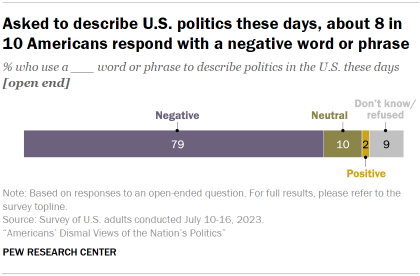
Majorities say they always or often feel exhausted (65%) and angry (55%) when thinking about politics these days, while relatively few report feeling hopeful (10%) or excited (4%) with this much frequency.
Despite the public’s weariness with politics, most Americans still believe voting can make a difference. Nearly six-in-ten (57%) say voting can have at least some effect on the country’s future, though just 20% say it can affect it a lot.
And more people say voting can bring about positive change than say that about volunteering for an organization or political group, donating to charity or a political campaign, or running for office.
Politics in a single word or phrase: An outpouring of negative sentiments
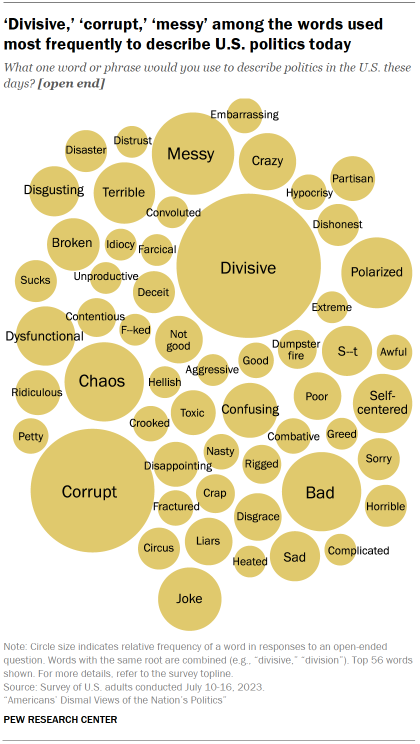
When asked to describe politics in the United States these days in a single word or phrase, an overwhelming majority of Americans (79%) express a negative sentiment. Just 2% offer a positive word or phrase, while 10% say something neutral.
The word “divisive” (and variations such as “dividing”) appears most frequently among the responses, with 8% saying this. An additional 2% use the related term “polarized.” Second-most frequent is “corrupt” (chosen by 6% of respondents), consistent with the views many Americans express elsewhere in the survey that politicians are looking out only for their own interests.
Other common words include those that suggest that politics today just doesn’t work, with “messy,” “chaos,” “broken” and “dysfunctional” each among the top 15 words. And many respondents are even more negative in their views: “terrible,” “disgusting,” “disgrace” and the phrase “dumpster fire” each are cited by at least 1% of survey respondents.
Negative emotions prevail when Americans think about politics
Nearly two-thirds of adults (65%) say they always or often feel exhausted when they think about politics these days. Another 25% sometimes feel exhausted, while 9% rarely or never feel this way.
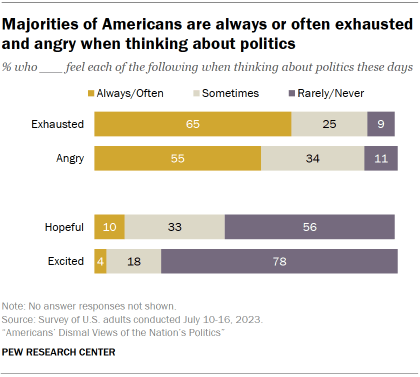
A majority (55%) also always or often feels angry when thinking about politics; just 11% say they rarely or never feel this way.
A much smaller share of the public reports frequently feeling positive emotions when thinking about politics: One-in-ten always or often feel hopeful, and just 4% feel excited about this frequently.
A majority of adults (56%) say they rarely or never feel hopeful, and 78% rarely or never feel excited when thinking about politics these days.
The most politically engaged are the most exhausted and angry
Those who have the highest levels of engagement with politics are also the most likely to report exhaustion and anger when they think about politics these days.
Among highly politically engaged adults, 72% report feeling exhausted by politics always or often. The shares who say this decline as political engagement decreases: 68% of adults with a medium level of engagement and 56% of those with a low level of engagement feel exhausted always or often.

A similar pattern holds for anger: 69% of highly engaged adults say they always or often feel angry when thinking about politics, compared with 55% of those with a medium level of engagement and 43% of those with a low level of engagement.
Republicans and Republican-leaning independents are slightly more likely than Democrats and Democratic leaners to say they always or often feel angry when thinking about politics these days. But in both parties highly engaged adults are more likely to feel negative than those who are less engaged.
For example, highly politically engaged Republicans are 24 percentage points more likely than Republicans with a low level of engagement to always or often feel angry about politics (72% vs. 48%). And highly engaged Democrats are 23 points more likely to say this than Democrats with a low level of political engagement (65% vs. 42%).
Americans say the tone of political debate in the country has worsened
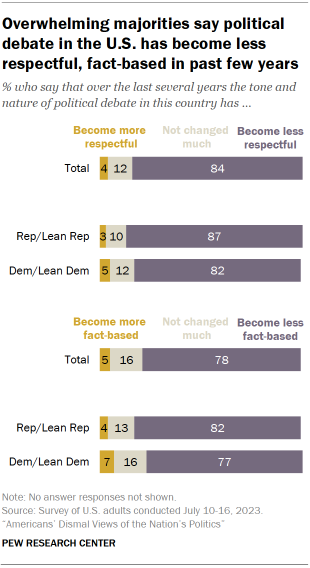
The public feels that the tone and nature of political debate has become less respectful and fact-based over the last several years.
An overwhelming 84% majority of adults say political debate has become less respectful over the last several years, while only 4% say it has become more respectful. About one-in-ten (12%) say it hasn’t changed.
Similarly, 78% say political debate has become less fact-based over the last several years, while only 5% say it has become more fact-based. Just 16% say it has not changed much.
Large majorities of adults in all political and demographic groups say that the tone and nature of political debate has become less respectful and fact-based in recent years.
Public evaluations today are nearly identical to views four years ago.
Which political topics get too much – and too little – attention?
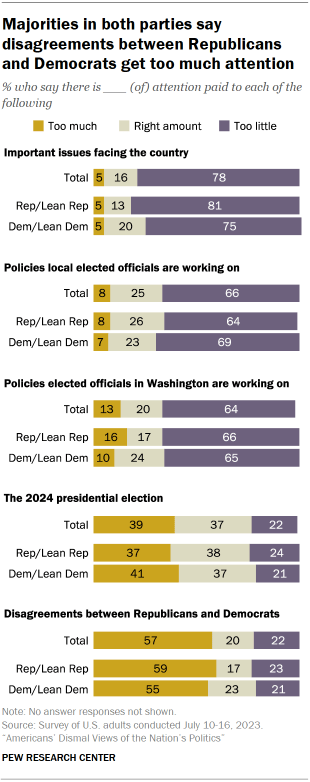
Large majorities of Americans say several political topics receive too little attention:
- 78% say there is too little attention to important issues facing the country;
- 66% say the same about the policies that local elected officials are working on;
- 64% say policies that federal officials are working on get too little attention.
By contrast, a majority of Americans (57%) say disagreements between Republicans and Democrats receive too much attention.
With a little more than a year before the 2024 presidential election, 39% say the campaign has gotten too much attention, while nearly as many say it has gotten the right amount of attention. About one-in-five (22%) say next year’s election has received too little attention.
Republicans and Democrats hold very similar views about whether too much or too little attention is paid to each of these topics.
For example, 81% of Republicans and 75% of Democrats (including those who lean to each party) say that too little attention is paid to important issues facing the country. And more than six-in-ten in both parties say too little attention is being paid to the policies elected officials in both their local area and in Washington, D.C., are working on.
Similar majorities in both parties say that too much attention is given to disagreements between the parties (59% of Republicans and 55% of Democrats say this).
Majority of Americans find it stressful to talk politics with people they disagree with
Around six-in-ten U.S. adults (61%) say having political conversations with people they disagree with is generally “stressful and frustrating,” while about a third (36%) say these types of conversations are generally “interesting and informative.”
While these views are largely unchanged from two years ago, the share of Americans who say they find talking politics with people they disagree with to be stressful is now higher than it was a few years ago. In May 2019, half said these types of political conversations were stressful, while a similar share (48%) said they were interesting and informative.
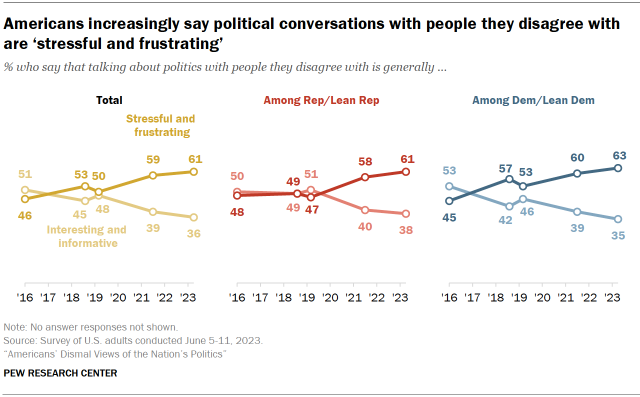
As has been the case since 2021, there is no partisan difference in the shares viewing political conversations with people they disagree with as stressful. In prior years, Democrats were somewhat more likely than Republicans to view these conversations as stressful and frustrating.
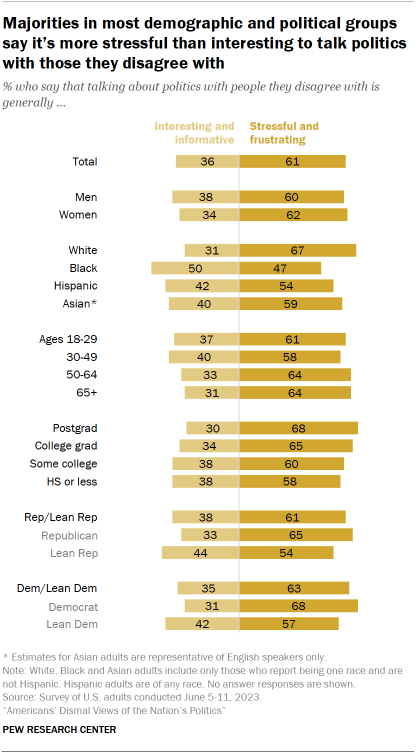
Across most demographic and political groups, majorities say these conversations are more stressful and frustrating than interesting and informative.
Gender
Similar-sized majorities of men (60%) and women (62%) say talking politics with people they disagree with is stressful, while men are slightly more likely than women to find these conversations interesting (38% vs. 34%).
Race and ethnicity
Two-thirds of White adults find these types of political conversations stressful, as do 59% of Asian adults and 54% of Hispanic adults. Black adults are more evenly divided: 47% say these conversations are stressful and frustrating, while 50% say they are interesting and informative.
Age
While majorities in all age groups say conversations with those they disagree with are generally stressful, adults 50 and older are somewhat more likely to say this than younger adults (64% vs. 59%).
Education
Differences by education are similarly modest. Roughly two-thirds (66%) of those with at least a bachelor’s degree say they find talking politics with people they disagree with stressful, while about six-in-ten (59%) of those with less education say the same.
Partisanship
While similar shares of Democrats and Republicans say political conversations with those who disagree with them are stressful and frustrating, partisans are more likely than leaners – political independents who lean toward a certain party – to say the same.
In both parties, more than six-in-ten partisans say they find political conversations with those they disagree with as stressful, while around a third say they are interesting. By contrast, around four-in-ten leaners say these types of conversations are interesting, and more than half say they are stressful.




